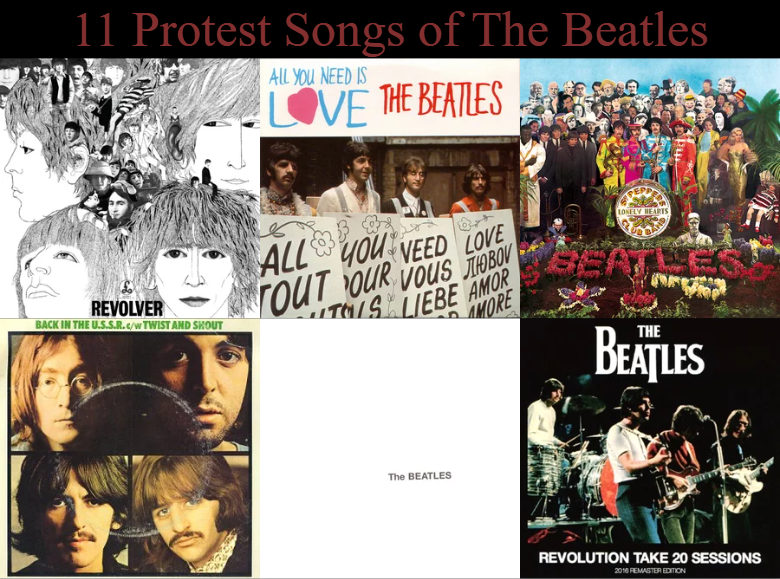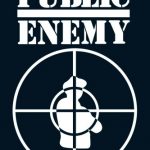
Although The Beatles weren’t known as a political band, at times they spoke out on social issues. For example, during their 1965 American tour, they refused to perform in front of segregated audiences. At times, they also addressed social issues through their music. Here is a sampling of 11 of their protest tunes. Also, check out the video version of the article.
Think for Yourself (1965)
Appearing on the album Rubber Soul, this song is about narrow-mindedness and could apply in both a political and personal context. Written by George Harrison in his 1980 autobiography I, Me, Mine, he was a bit vague on the meaning, but acknowledged that it was “probably the Government” that he wrote it about.
Taxman (1966)
From the album Revolver, this is another tune composed by George Harrison. The lyrics were in protest of the progressive tax system in the U.K. that took 95% of their earnings. The lyrics also reference Prime Minister Harold Wilson and Conservative Party leader Ted Heath, whom he deemed responsible for the exorbitant tax rates. Harrison was also motivated to write the tune due to frustration over his taxes going towards military funding.
I’m Only Sleeping (1966)
Going back and forth, whether or not to include this tune from Revolver, because, based on my research, the song is about the fact that John Lennon slept a lot. But there was an article written by Tom Taylor for Far Out that argues that it was the fiercest protest song ever by both John Lennon and The Beatles. Even though he doesn’t cite any specific sources, he makes connections to John Lennon and Yoko Ono’s 1969 bed-in peace protest, citing the song as an important precursor. He also suggests that sleep is used metaphorically as an act of resistance, making the choice not to participate in a capitalist system. At the very least, he makes compelling arguments.
Yellow Submarine (1966)
According to Paul McCartney, he was just writing a children’s song, with no other intentions. But the tune was also adopted by the counterculture as an anti-authoritarian anthem that was used during anti-Vietnam rallies, along with other strikes and protests.
All You Need Is Love (1967)
This single was written as Britain’s contribution to Our World, the first live global television link which was watched by over 400 million people in 25 countries. The lyrics became a Summer of Love anthem which promoted love and unity in the wake of the Vietnam War.
She’s Leaving Home (1967)
This tune is from the band’s groundbreaking album Sgt. Pepper’s Lonely Hearts Club Band. Not an explicitly political album, but it was considered to be an important part of the counterculture. In a sense, the band was rebelling or protesting against their previous mop-top image. This particular tune was inspired by a news report about a runaway 17-year-old girl named Melanie Coe. The song explores the generational gap between the counterculture generation and their parents.
Back in the U.S.S.R. (1968)
This tune is from the White Album, the band’s most explicitly political album (features four songs from this list). The song is a parody of both Chuck Berry’s “Back in the U.S.A.”, and the Beach Boys’ “California Girls”. The tune could be viewed as a satirical critique of a distorted, idealized view of Americana. The song also received criticism from both sides of the political aisle for promoting communism.
Blackbird (1968)
This gorgeous tune from the White Album, “Blackbird,” was written by Paul McCartney. McCartney in support of the U.S. Civil Rights movement during the 1960s. Part of the motivation was the Little Rock Nine, who were nine black girls who in 1957 were enrolled into the newly desegregated Little Rock Central High School.
In an interview with Apple Music, McCartney explained why he choose to use black bird as a metaphor for black girl, instead of being more direct: “I use metaphors so that, on the one hand, if you’re a little kid…a lot of little kids say to me that ‘Blackbird’ is their favorite song,” McCartney said. “So, if you’re a little kid, they don’t know about civil rights. They’re seeing a blackbird and the freedom, and they’re feeling the idea of just escaping barriers and stuff. They just like it as a little song…It’s not hiding it, it’s just using a metaphor. I sometimes think that’s stronger.”
Beyoncé also performed a powerful version of the tune on her 2024 album Cowboy Carter.
Piggies (1968)
This George Harrison-composed tune, which appears on The White Album, was inspired by George Orwell’s Animal Farm, and an early draft of the song concludes with the animals saying “Paying piggy thanks, to thee Pig Brother!” This anti-establishment tune is a critique of materialistic greed and class distinction.
Revolution (1968)
Lennon composed the tune in response to the anti-Vietnam War protests that were taking place. Originally a B-side to “Hey Jude”, a slightly different version, “Revolution 1,” appeared on The White Album (the album also included the experimental sound collage “Revolution 9”). The lyrics supported change, but opposed using violent methods to accomplish it, as denoted by the line “you can count me out”. Some left-leaning individuals criticize the lyrics for being too passive. One notable critique was from Nina Simone, who wrote the response song also entitled “Revolution,” which appeared on her 1969 album To Love Somebody.
Come Together (1969)
The tune originated from a campaign song that John Lennon was asked to write for Timothy Leary’s intended bid to run for Governor of California. The song itself isn’t particularly political, but the call to “Come Together” could be viewed as a message of unity and purpose.
Bonus Track:
Drive My Car – Nano and the 6-2-4 (2018)
This reworking of “Drive My Car” by Nano and the 6-2-4 is a project of students of Berklee College of Music in Boston. It was arranged by cellist Naseem Alatrash and featured lead vocals in both Arabic and English by Nano Raies. Raies is a Syrian refugee and Alatrash is from Palestine. It is transformed into a female empowerment anthem when sung from the perspective of a Saudi Arabian women who previously was unable to legally drive. When translated into Arabic the tune becomes “Rahsoul Say-arah” which translates as “I will drive the car.”

